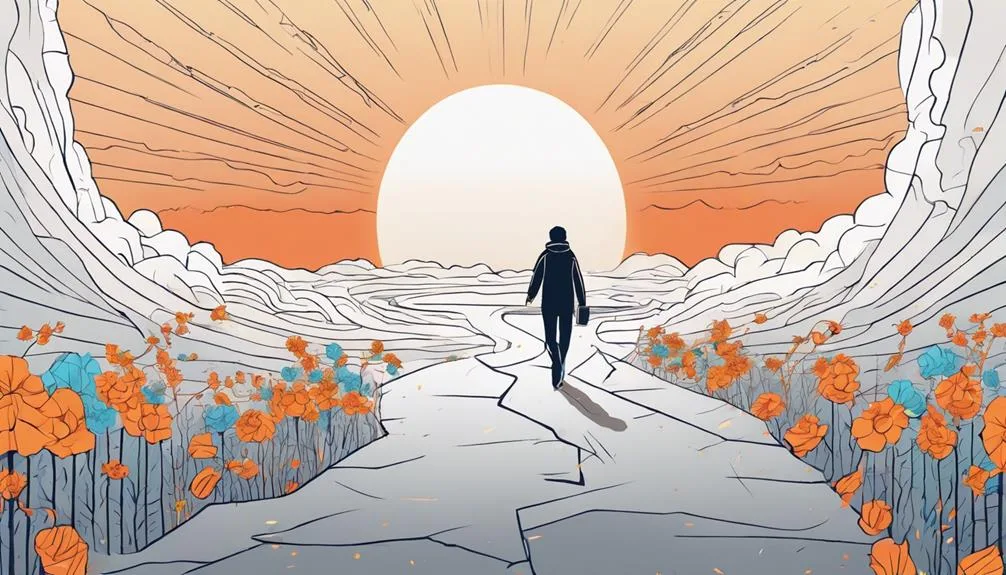Leaving a toxic relationship is tough. It's hard to know the best way to do it, even when you see the problems. Setting clear personal limits and having friends or family to support you is crucial.
Thinking about leaving and actually doing it are different, and both need careful planning. The journey to get your peace back is not easy, but it's important to think about why it's worth it for you.
Key Takeaways
- Recognize toxic traits to take the first step toward leaving a detrimental relationship.
- Set and enforce firm boundaries to safeguard your well-being.
- Build a support system of friends, family, and professionals for guidance and strength.
- Plan your exit carefully, considering safety, financial independence, and emotional healing.
Recognizing Toxic Traits

Recognizing toxic traits in a relationship is the first important step towards reclaiming your peace and well-being. You'll notice it first in the way you communicate. Healthy communication patterns are open and respectful, but in a toxic setup, you're often met with criticism, dismissals, or outright silence.
It's not just about what's said, but how it's said. This erosion of open dialogue chips away at your self-esteem, leaving you questioning your worth and decisions. The impact on your self-esteem can be vital, altering how you view yourself and your capabilities.
Understanding these signs is vital. It's about seeing the patterns for what they are—destructive and not conducive to a healthy, supportive partnership. Recognizing this is your cue to take action for your own health and happiness.
Setting Firm Boundaries

Once you've identified toxic traits in your relationship, it's time to start setting firm boundaries to protect your well-being. This step is all about personal empowerment and asserting your needs through effective communication techniques.
Make it clear what behavior you won't tolerate and what actions you'll take if your boundaries are crossed. It's important to be consistent and follow through. Remember, setting boundaries isn't about controlling the other person; it's about respecting yourself. Don't negotiate your well-being.
Be concise and assertive in your communication. This might feel uncomfortable at first, but it's an essential step in reclaiming your peace and autonomy. You deserve a relationship that respects your boundaries and contributes positively to your life.
Seeking Support Systems

As you navigate the journey of leaving a toxic relationship, it's important to lean on a supportive network of friends, family, and professionals for guidance and emotional strength. Building a robust support system is key for your emotional resilience, enabling you to face challenges with a stronger mindset.
Here's how to seek out the support you need:
- Reach out to trusted friends and family who understand your situation and can offer emotional support and practical advice.
- Utilize community resources designed to help individuals in toxic relationships, including counseling services and support groups.
- Consult professionals like therapists or counselors who specialize in relationship issues to gain insights and strategies for building emotional resilience.
These steps are essential in creating a foundation of support that will empower you through this transformative period.
Planning Your Exit

You'll need to craft a detailed plan for leaving the toxic relationship, focusing on both your safety and emotional well-being. Begin by quietly gathering your personal documents and securing a safe place to stay, whether it's with a friend, family member, or a shelter.
Next, address legal considerations, especially if you're married or share assets and children. Consult with a lawyer to understand your rights and the steps you'll need to take.
Achieving financial independence is important. Start by setting aside funds in an account only you can access. If you don't have personal income, explore job opportunities or financial assistance.
Healing After Leaving

After carefully planning your exit and stepping away from the toxic relationship, it's time to focus on your journey toward healing. This phase is important for regaining your sense of self and building emotional resilience.
Here are three key steps to guide you:
- Prioritize Self-Care: Dedicate time each day to activities that nurture your body and mind. Whether it's reading, taking long walks, or practicing meditation, find what replenishes your spirit.
- Seek Support: Don't hesitate to lean on friends, family, or professionals who can provide the encouragement and perspective you need.
- Set Boundaries: Learn to say no and establish limits that protect your emotional well-being. This reinforces your self-respect and aids in building a healthier future.
Conclusion
Exiting a toxic relationship is a courageous step towards embracing your own happiness and health. By acknowledging the harmful dynamics, establishing boundaries, seeking support, and carefully planning your departure, you've started on a path to healing.
This journey, though challenging, paves the way for a life enriched with respect, love, and joy. As you continue to heal and rebuild, consider the strength and resilience you're cultivating. Are you not, in every moment of growth, moving closer to the life you deserve?
Let this thought guide you forward, gently reminding you of the brighter future that awaits.

